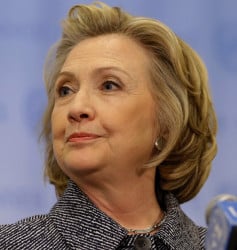DES MOINES, Iowa, (Reuters) – Hillary Clinton’s struggle in Iowa to fend off underdog Bernie Sanders, a self-described democratic socialist, reignited questions about her ability to close the deal with Democratic voters and turned up the pressure on her high-profile White House campaign.

The Democratic presidential front-runner, whose campaign ran off the rails in Iowa in 2008 against Barack Obama, was dealt another setback on Monday in the Midwestern state that begins the 2016 race for the presidency.
The former secretary of state, Clinton, 68, was pushed to a virtual tie with Sanders, a 74-year-old U.S. senator from Vermont.
Next up is New Hampshire, which holds its primary on Feb. 9. Sanders has been leading in opinion polls there and has an advantage because it neighbours his home state. A Clinton loss would start to set off alarm bells with her supporters.
“She has had every possible structural and organizational advantage and Sanders fought her to a draw,” said Dan Schnur, director of the Jesse M. Unruh Institute of Politics at the University of Southern California.
“This is almost a moment by moment rerun of 2008,” Schnur said. “The difference is her competition is not as tough this time.”
Clinton insisted at her post-caucus rally that she was the candidate who could unify her party and prevail against a Republican challenger in the Nov. 8 election but the sense of disappointment was palpable.
Her subdued, six-minute speech contrasted with the ebullient tone of Sanders’ 16-minute speech.
With no clear victory to announce, Clinton’s campaign scrapped a plan to have her daughter Chelsea and her husband, former President Bill Clinton, introduce her. They stood alongside her instead, with Bill Clinton wearing his campaign logo badge upside-down.
Aides removed the TelePrompter at the last minute, supporters at the Drake University rally told Reuters, in a further indication of last-minute changes in plans.
While the race in Iowa had tightened in recent weeks, her aides had appeared to draw some confidence from a Des Moines Register/Bloomberg politics poll over the weekend that showed Clinton with a three-percentage-point lead over Sanders among likely caucus-goers.
Into the early hours of yesterday morning, Clinton and Sanders remained separated by less than a single percentage point. The race was so tight that several precincts were forced to decide whether Clinton or Sanders got the winning votes – and one more delegate – by a coin toss, following the state Democratic Party’s advice.
The MSNBC television network finally called the race for Clinton at nearly 3 a.m. CST (0900 GMT), and Clinton’s Iowa state director Matt Paul issued a statement declaring victory with “no uncertainty.”
Opinion polls show Clinton still faces an enthusiasm gap with Sanders and her Republican rivals, whose race attracted a record turnout in Iowa. Voters have persistent doubts about her honesty and trustworthiness after months of controversy over her use of a private email server for government work while secretary of state.
Sanders, who launched his campaign nine months ago with a small, sparsely attended news conference on Capitol Hill, has excited liberal activists with an anti-establishment message that calls for eradicating income inequality, breaking up the big banks and providing free college tuition.
Iowa was a good state to test that message, given the heavy liberal bent of the Democratic activists who dominate the caucus process. Entrance polls of Iowa caucus-goers showed 68 percent described themselves as very or somewhat liberal.
Fundraising figures reported on Sunday by Sanders underscored the extent to which his campaign has grown into a popular movement.
Clinton has raised more than Sanders – her campaign brought in $109 million last year compared to his $73.5 million. But 75 percent of his haul came from donations of $200 or less, in contrast to only 18 percent of Clinton’s, and far more of Clinton’s donors have hit the $2,700 donation limit.
Still, Sanders faces significant challenges when the Democratic nominating contest moves to the more diverse states of Nevada and South Carolina before expanding to 11 states on March 1, “Super Tuesday,” including seven in the South where Clinton’s advantage with African-American voters could begin to pay off.
“Iowa was built for Bernie Sanders,” said Democratic strategist Joe Trippi, who nevertheless said the strong showing by Sanders means “this race goes on longer than Clinton wanted it to.”

